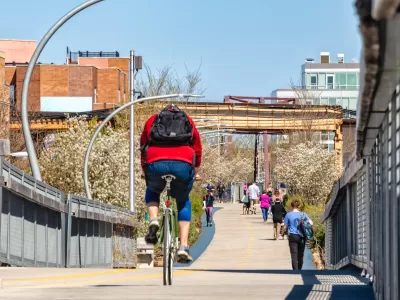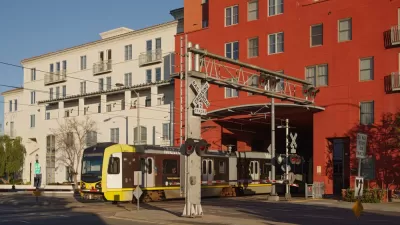Six principles for building vibrant, accessible communities with a focus on sustainable transportation.

An article by Brendan Hurley in Momentum offers “a brief overview into a strategic framework for urban development that prioritizes sustainable and transit-friendly living” informed by lessons gleaned from Vancouver’s TransLink transit authority using ‘6 Ds.’
“Shaped by a commitment to enhancing transit corridors and discouraging unnecessary driving, the outlined strategies aim to create urban environments that are not only well-connected but also environmentally conscious, fostering a balance between functionality and sustainability,” Hurley writes.
The first D, destinations, emphasizes the need for TOD projects to be in appropriate, high-demand locations. The second, distance, calls for a “fine-grained” pedestrian, bike, and transit network that keeps walking distances manageable between as many destinations as possible.
Other principles include design for bikes and pedestrians, density, and diversity: “A mix of housing types, uses, tenures, sizes, price points, retail, leisure and employment opportunities allows a resilient balance of activities and jobs in easy walking and biking range.”
The final D, demand management, calls for “Measures that make it less easy to drive or that express the real cost of car use” to promote a shift to more sustainable transit modes.
FULL STORY: The 6 D’s of Sustainable Transit-Oriented Development

Maui's Vacation Rental Debate Turns Ugly
Verbal attacks, misinformation campaigns and fistfights plague a high-stakes debate to convert thousands of vacation rentals into long-term housing.

Planetizen Federal Action Tracker
A weekly monitor of how Trump’s orders and actions are impacting planners and planning in America.

In Urban Planning, AI Prompting Could be the New Design Thinking
Creativity has long been key to great urban design. What if we see AI as our new creative partner?

King County Supportive Housing Program Offers Hope for Unhoused Residents
The county is taking a ‘Housing First’ approach that prioritizes getting people into housing, then offering wraparound supportive services.

Researchers Use AI to Get Clearer Picture of US Housing
Analysts are using artificial intelligence to supercharge their research by allowing them to comb through data faster. Though these AI tools can be error prone, they save time and housing researchers are optimistic about the future.

Making Shared Micromobility More Inclusive
Cities and shared mobility system operators can do more to include people with disabilities in planning and operations, per a new report.
Urban Design for Planners 1: Software Tools
This six-course series explores essential urban design concepts using open source software and equips planners with the tools they need to participate fully in the urban design process.
Planning for Universal Design
Learn the tools for implementing Universal Design in planning regulations.
planning NEXT
Appalachian Highlands Housing Partners
Gallatin County Department of Planning & Community Development
Mpact (founded as Rail~Volution)
City of Camden Redevelopment Agency
City of Astoria
City of Portland
City of Laramie





























